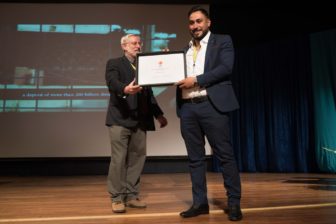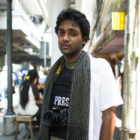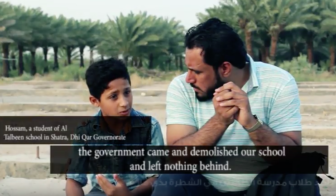
Global Shining Light Award winner for 2017, Assad Al-Zalzali, with GIJC’s David Kaplan. Photo: Daylin Paul.
“Every day, my mother says, ‘Please don’t do this job. Please, don’t do work like this,’” said Asaad Al-Zalzali, an investigative journalist at Beladi TV in Iraq. Journalism is notoriously dangerous in Iraq: In the four weeks preceding #GIJC17 in Johannesburg, three of Al-Zalzali’s fellow practitioners were killed. But this mother’s son risked his life to expose a story that would benefit the children of others.
“Iraq suffers from 20 percent illiteracy,” said Al-Zalzali, speaking through an interpreter on Sunday at the session “Lightning Round: Stories You’ve Never Heard Of.” It’s a number that’s spiked in recent years, and Al-Zalzali set out to discover what the Iraqi government was doing about it.
There are more than 3,000 school buildings made of mud in Iraq, and an estimated 1 million school children who have been “leaked from the education system.” Clearly, education should be a government priority, but where was the allocated money going?
Five years before, “the government had undertaken to build 1,700 new schools with a budget of $200 million,” said Al-Zalzali of his story “Project No. 1,” which won the 2017 Global Shining Light Award on Saturday night. He and his team spent a year gathering and crosschecking 150 documents to discover where the whereabouts of the cash. This is what they found:
- The Ministry of Education had awarded the building contract to a private company owned by the main supporter of one of the “second or third largest” political parties in the country.
- Then, they discovered that the ministry had given this businessman 60 percent of the contract as an upfront deposit, something prohibited by Iraqi law, which caps the upfront payment amount at 10 percent.
- Lastly, they discovered that $200 million dollars had disappeared from his bank account and been sent outside the country.
“Only between 1 and 15 percent of the project had been completed,” said Al-Zalzali. “The corrupt businessman continued to live comfortably, and the government didn’t question him about where all that money had gone.”
When Al-Zalzali confronted the businessman concerned, his legal representative knew they had been cornered. “He admitted they took those $200 million,” said Al-Zalzali. Following the revelation, the businessman was jailed for seven years, and 12 implicated government officials were dismissed.
Meanwhile, in Lebanon, investigator Youmna Fawaz embarked on a year-long investigation to uncover the story of Syrian refugee children fleeing from Raqqa to Bekaa, where their fathers forced them to work in marijuana fields.
“The dream of these children is to enroll in schools and own bicycles, but the fathers … believe that it’s their children’s duty to help in providing food,” said Fawaz.
“It was extremely obvious during my broadcast with these children that they’re very calm and relaxed. This is due to the inhaled marijuana odor all day long,” she said. It is difficult to forget “their cracked hands and exhausted faces.”
The areas that Fawaz covered were out of the Lebanese state’s control and ruled by Al-Tuffar, an outlawed group made up mostly of drug dealers.
Once the documentary aired, some of the affected parties waged “a dirty campaign against me on social media,” she said. “I am working on suing them in court.”
They went further than that: a group of people that she’d encountered in the field were offered cash to “host” her under false pretences in Bekaa and then kidnap her. Luckily, she was warned about the setup and never made the journey to Bekaa.
Even today, there are places to which she cannot travel.
“In my house there are a lot of security cameras,” she said. But her work has been noticed by UNICEF, which has adopted her documentary as an official record of child labor. “I’m going to push them to use the video to talk more about this problem worldwide,” she said.
Al-Zalzali and Fawaz are two examples of the many investigative journalists risking their own physical safety to provide a voice for marginalised children across the globe.
Despite the difficulties of their profession, both journalists continue to push forward in their field.
“This is my country, these are my people,” said Al-Zalzali, speaking after the event. “I won’t go and leave journalism now, when they really need me.”
 Thalia Holmes is a South African freelance journalist specializing in business, health and long-form feature writing. She has won various national awards for her work. Previously she worked at the Mail & Guardian as a business reporter, and was a management consultant in a former life before finding her passion in media.
Thalia Holmes is a South African freelance journalist specializing in business, health and long-form feature writing. She has won various national awards for her work. Previously she worked at the Mail & Guardian as a business reporter, and was a management consultant in a former life before finding her passion in media.
 Daylin Paul is an independent photographer, visual journalist and photojournalism educator based in Johannesburg. He is the 2017 winner of the prestigious Ernest Cole Award for Photography for his ongoing documentary Broken Land and the 2017 Hostwriter Pitch Prize for Collaborative Journalism. His work has appeared in The New York Times, The Guardian, Foreign Policy, Financial Times and Huffington Post.
Daylin Paul is an independent photographer, visual journalist and photojournalism educator based in Johannesburg. He is the 2017 winner of the prestigious Ernest Cole Award for Photography for his ongoing documentary Broken Land and the 2017 Hostwriter Pitch Prize for Collaborative Journalism. His work has appeared in The New York Times, The Guardian, Foreign Policy, Financial Times and Huffington Post.


Maximum of the country in this world, Investigative journalist is at so risk.